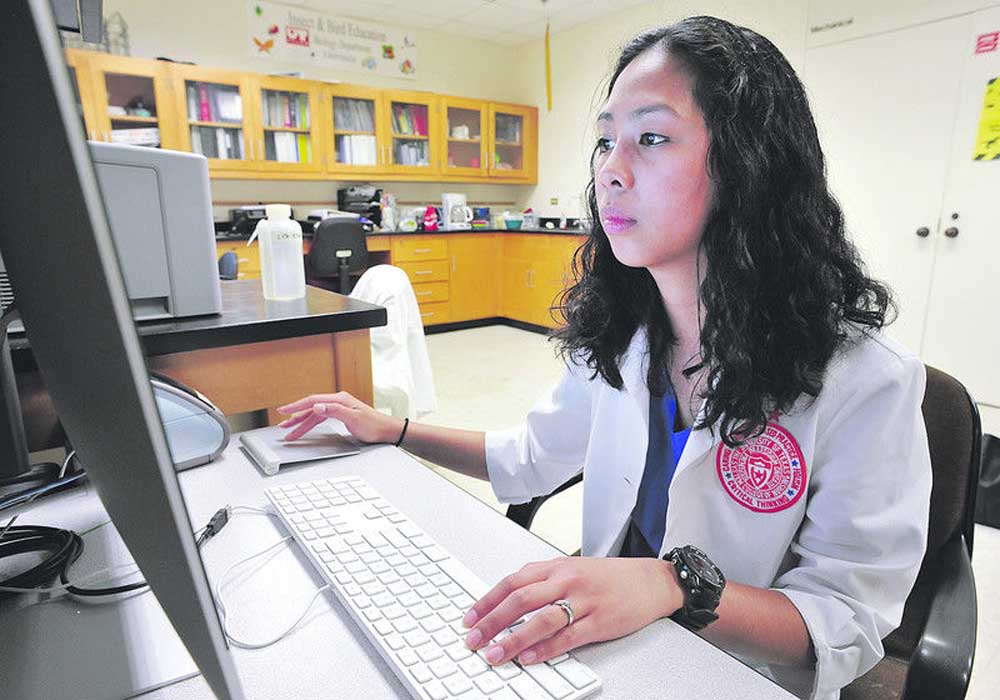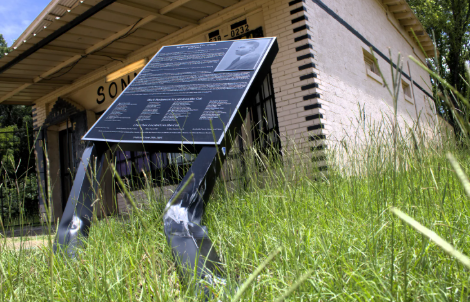UT Tyler honors students are a select group
Published 7:35 pm Monday, April 18, 2016

- Senior Honors Program student Katrina M. Tilaon works on the computer in her lab, compiling research data, on Wednesday, March 30, 2016, at the University of Texas at Tyler. The Honors Program crosses disciplines, giving students opportunities to step beyond the minimum graduate requirements, to expand their academic horizons. (Andrew D. Brosig/Tyler Morning Telegraph via AP)
If a coach needs to send in a play to a football player, normally it comes through a radio in the helmet that can easily malfunction. A mouthpiece invented by a University of Texas at Tyler honors student will not only allow the player to hear the coach but also protect his teeth.
J.R. Gutsch, a junior engineering student, is applying for a patent for the mouthpiece, which has a receiver and relies on bone to conduct noise to the ear.
Trending
He created the mouthpiece while doing individualized research with faculty members that is required of all UT Tyler honors students in their junior or senior year.
“That’s a very unusual kind of project for a 20-year-old,” said Dr. Paul Streufert, director of the honors program and associate professor of literature and languages.
“I love being able to work with students who are doing creative and interesting things.”
Benjamin Strobe, a senior economics and political science major, studied the effects student loan debt has on young professionals’ ability to buy a house. He concluded that having student loan debt is not as crippling as it might be perceived and will not necessarily preclude someone from buying a house.
Sally Stratman, a senior psychology major, has presented her research at numerous research conferences including the National Collegiate Honors Council, the national organization that governs college honors programs across the U.S.
“The honors program teaches us to look at the world through many different lenses,” she said.
Trending
She is doing research on the stereotype threat – the phenomena of girls performing poorly on a math test when everyone thinks girls are bad at math compared to girls who were not told that.
Miss Stratman wanted to see if the same mechanism is in place for non-traditional students ages 24 or older studying for an undergraduate degree who were made to believe that people thought less of them for being older.
She found they are “resilient against this mechanism, but they do seem to have higher test anxiety, which does lower their performance by a small margin.” Her research also found non-traditional students feel very isolated because they are surrounded by younger students and have high dropout rates.
Her first research project consisted of a cost-benefit analysis of adoption versus childbirth both in the U.S. and internationally.
“If you adopt from the foster care system, it is incredibly cheap. If you have a baby without insurance, it’s incredibly expensive. If you have a baby with insurance, it can be much cheaper. If you adopt a baby internationally, it’s very expensive,” Miss Stratman said.
She said there is a huge racial component in the adoption industry.
“White babies are the most high in demand and they cost the most. Black babies, especially black baby boys, cost the least because they are the least in demand,” Miss Stratman said.
Students in the honors program exhibit curiosity, hard work, are smart and investigate things, Streufert said.
They are a select, exclusive group. Twenty-four freshmen out of approximately 80 applicants are accepted … that’s one out of every three or four applicants.
Getting in is very competitive. If applying as a freshman, applicants must not only have a high grade point average and have engaged in lots of extracurricular activities in high school, they must write an essay and undergo an interview.
“We interview every student who applies and we look for intellectual curiosity,” Streufert said. “Are they engaged in many different things and able to do many sorts of things rather than saying, ‘I only do art or I’m only a math person’? We are looking for people who can see the world has many things to offer and who want to take advantage of as many of those things as they can.”
The honors program, Streufert added, “is for students who want to engage on a deeper intellectual level when they get to college rather than doing the standard curriculum and look at things from more than one perspective.”
The program cultivates and develops students’ intellectual curiosity.
Being in the honors program is not the normal college experience; it’s more intellectually based and more challenging, Streufert said.
There are pathways for sophomores and juniors to enter the program, too. All students accepted receive a $2,000 scholarship per year.
It is an umbrella honors program that accepts all different majors.
“We look for the best students we can find spread out over all the majors because we think one of our greatest strengths is having mixed people,” Streufert said. “We love having lots of different viewpoints and lots of different ways of approaching problems.”
Good Shepherd Episcopal School, a small private school in Tyler, currently has seven of its graduates in the honors program. Four came in one year. “That is definitely unusual,” Streufert said. “Good Shepherd has provided us some exemplary students.”
To stay in the honors program, they must maintain a 3.2 grade point average and participate in four colloquium events per semester. Colloquium consists of field trips or lectures by local, regional or national figures, such as former Lt. Gov. Bill Ratliff and Steve Lopez, author of a book called “The Soloist.”
With only 110 students out of UT Tyler’s total enrollment of approximately 8,000 in the honors program, the honors students gain a sense of community among themselves, Streufert said. They also have a closer connection to the faculty, getting to know them better, he said.
Honors students participate in honors classes in addition to regular classes. Honors classes are team-taught, bringing two authorities into the classroom. For instance, a history professor and a film professor co-teach a film course, giving students both the film history and the historical perspective.
At graduation, honors students receive a medal and recognition that they did something above and beyond the norm. A notation is placed on their transcript so that whenever they turn a transcript in for graduate school or a job, people can see they worked harder and did more work than other graduates.
TWITTER: @Betty_TMT






